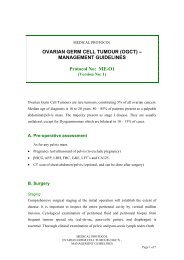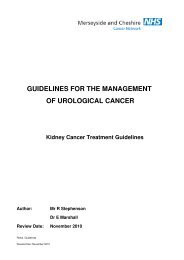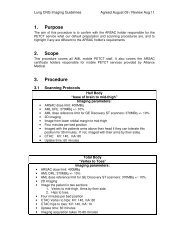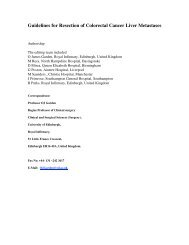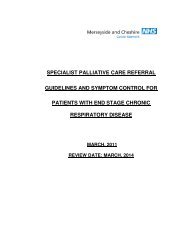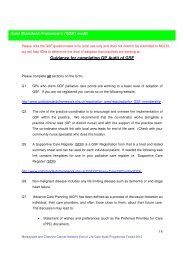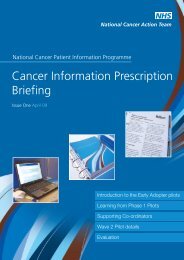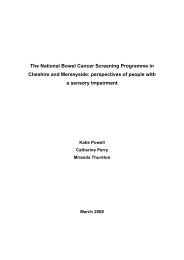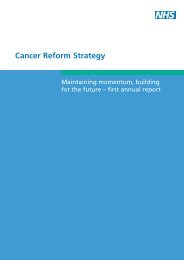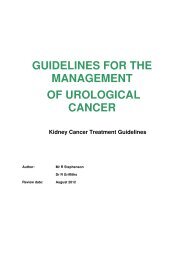Cancer Reform Strategy - NHS Cancer Screening Programmes
Cancer Reform Strategy - NHS Cancer Screening Programmes
Cancer Reform Strategy - NHS Cancer Screening Programmes
- No tags were found...
You also want an ePaper? Increase the reach of your titles
YUMPU automatically turns print PDFs into web optimized ePapers that Google loves.
84Chapter 6:Reducing cancer inequalitiesChapter Summary●●●●Inequalities in cancer outcomes are experienced by a range of different groups in societyincluding socio economically deprived groups, black and minority ethnic groups, older oryounger people, men or women, people with disabilities, people from particular religions orwith particular beliefs and gays, lesbians or bisexuals. Inequalities may vary according to thetype of cancer as well as other factors such as location;Although the inequalities gap between the most deprived groups and the generalpopulation has got smaller, more needs to be done to tackle inequalities as experienced byall these different groups;Priority should be given to action to reduce smoking among groups with a high smokingprevalence and to increase awareness of the risk factors and symptoms for cancer amonggroups with low awareness; andWe will begin a National <strong>Cancer</strong> Equality Initiative, bringing together key stakeholders fromthe professions, voluntary sector and academia to develop research proposals on cancerinequalities, test interventions and advise on the development of wider policy.Introduction6.1 The <strong>Cancer</strong> <strong>Reform</strong> <strong>Strategy</strong> has beensubject to an Equality Impact Assessment whichshows that there will be no overall adverseeffect on inequalities as a result of the measuresfor cancer that we are introducing. However, wewant this strategy to go much further than that,achieving a substantial reduction in inequalitiesin cancer. One of the key aims of the <strong>Cancer</strong><strong>Reform</strong> <strong>Strategy</strong> is to reduce inequalities incancer incidence and increase access to highquality cancer care and cancer outcomes.6.2 Inequalities may be experienced by a rangeof different groups within society. These include:●●Socio economically deprived groups;Black and minority (BME) ethnic groups;●●●●Men or women;People with disabilities;People from particular religions or withparticular beliefs; andGays, lesbians or bisexuals.6.3 There are multiple potential sources ofinequality relating to cancer, which can impacton incidence, survival, mortality, patientexperience or quality of life. These include:●●●Exposure to infections linked to cancer;Genetic risk of developing cancer;Awareness and attitude to lifestyle riskfactors for cancer;●Older or younger people;●Uptake of prevention and screening services;



